With the party conference upon us, how do industry leaders really feel about the government’s economic policies? Sarah Richardson and Will Hurst unravel the data compiled in Building’s first CEO State of the Nation White Paper
For construction bosses, you might expect the party conference season, which kicked off this week, to be a pretty unpalatable reminder of the lack of support shown by politicians for the sector. The industry is, after all, facing a drop in output of more than 3% over the next 18 months, the worst insolvency rate of any business sector - and the deep cuts to public sector spending are only just now starting to bite.
However, despite the ongoing pressures facing the industry, exclusive research for Building shows that most of the industry’s leaders still support the broad thrust of government economic policy. A survey of 55 of the sector’s most senior chief executives and directors for Building’s first CEO State of the Nation White Paper shows that 81% believe that spending cuts were necessary - even though 37% believe they were too severe and 19% think they should not have been made until the economy had improved.
So, just how bad is the current market - and if government policy is not really at fault, what do the industry’s top bosses believe needs to happen to improve the outlook? Here, Building reveals selected findings from the white paper - launched in London yesterday at Building’s CEO Summit, sponsored by Fenwick Elliott, Aon and KPMG, - giving an insight into the answers offered by the sector’s most influential leaders.
Today’s market
The continuing strain on construction firms’ balance sheets is clear from the report, which surveyed chief executives from across the contracting, consulting and manufacturing sectors. On top of weak sentiment around recovery, part of the problem is the lack of availability of financing: only 15% said that the willingness of banks to lend to their businesses had improved over the last six months, with 21% saying it had worsened and 42% saying it had remained about the same.
In terms of the market, there is strong evidence that the North-South divide is widening, with Barbour ABI data included in the report, survey sentiment and interviews with 20 CEOs showing evidence of this.
There is also a high degree of anxiety about foreign competitors winning work in the UK market, with 40% of respondents either concerned or very concerned.
The response
Against this backdrop, those surveyed believed that recent trends towards industry consolidation are set to continue. Almost half of respondents said they expected their firm to be actively involved in consolidation, with 18% saying this would be through them acquiring other businesses, 9% through a merger and 18% through being acquired.
The chief executive of one major QS said: “Consolidation is, to a degree, inevitable. The real people at risk are those who are solely UK-based and are under 500 strong.”
Firms are also increasingly turning to international markets, with just under half of those surveyed saying that they expected the proportion of their international work to rise over the next two years. And despite the growth anticipated by economists in markets including China and Brazil, western Europe is the most popular target market abroad. Just under 60% of respondents identified this as an area of significant opportunity. One manufacturer identified Germany as a particular area of opportunity: “Exchange rates are favourable and the demand in Germany is very strong,” he said.
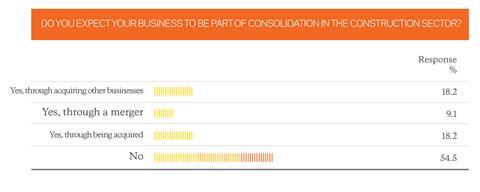
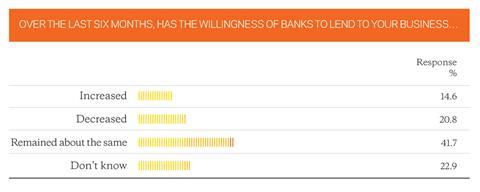
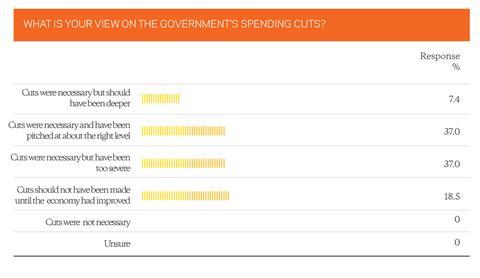
CEO spotlight on government policy: BIM
The government’s drive to make Building Information Modelling (BIM) mandatory on all public sector construction projects has created concern over implementation costs within industry. But despite this, there is strong evidence from chief executives that adopting the technology sooner rather than later is offering business advantage, and many believe that it will have a significant impact in driving down construction costs overall. Almost two-thirds of those already using the technology are planning on investing further in software or training over the next six months.
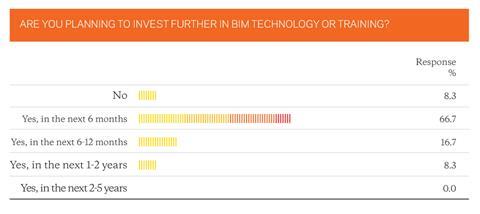
CEO spotlight on government policy: The Green Deal
Construction’s leading bosses believe that the government is failing to incentivise the Green Deal properly, in a move that casts doubt over the success of a policy which has the potential to create 250,000 jobs. Two-thirds of those surveyed believe the government is not doing enough to encourage homeowners to take up the policy, under which private finance will be used to pay for energy efficiency improvements to existing homes, with the money paid back by future energy bills. Paul Sheffield, the chief executive of Kier, told Building this week: “I find it all very confusing. If you can tell me where the funding is coming from and what projects are included, you are doing better than me. It is positive for the industry but it’s very difficult to give a precise view on what is coming and when. There is a budget coming up so I hope more certainty on the Green Deal comes with that.”
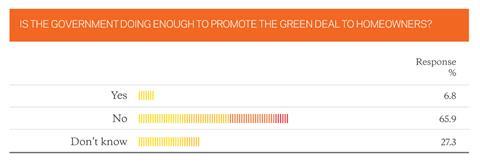
CEO STATE OF THE NATION WHITE PAPER
Building’s CEO State of the Nation White Paper will be published next week. It includes:
- Findings from 75 CEOs across the built environment through a survey and face to face interviews, including attitudes towards market confidence, Building Information Modelling and government policy
- Current economic overview and analysis
- Forecasting analysis
- Activity intelligence - contract and project data from Barbour ABI by region, sector, value plus intelligence and data on international markets
- Insight into the thinking of contractors, consultants, manufacturers and clients
- A legislative and regulatory overview.




























No comments yet